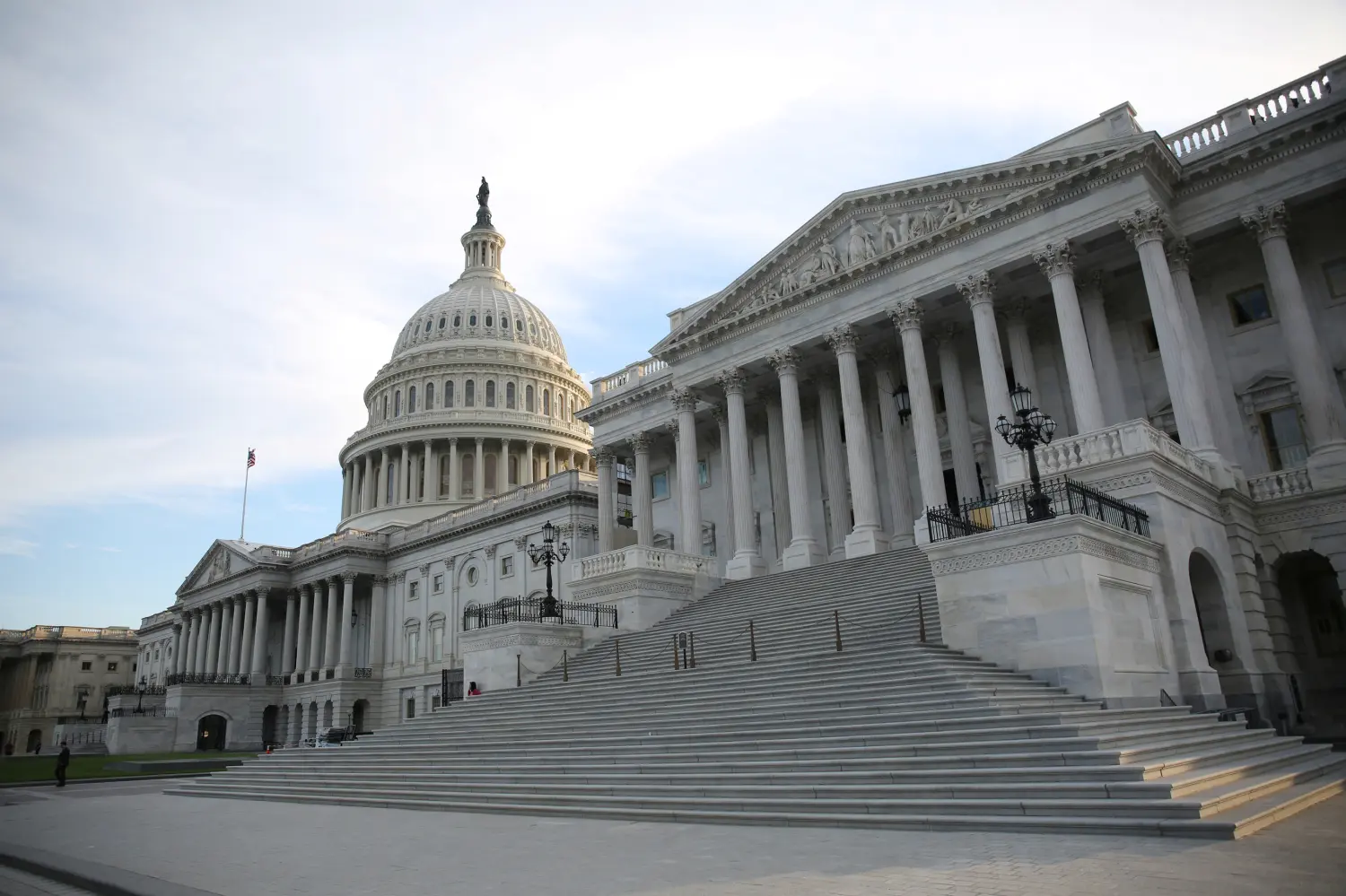Headlines
Senate Suspends Recess, Rules to Screen Buhari’s Ministerial Nominees

The Senate has decided to postpone its annual recess in order to screen President Muhammadu Buhari’s ministerial nominees.
The lawmakers had planned to embark on the vacation on Thursday. The recess usually lasts for about seven weeks.
The decision to postpone the recess was reached after the upper chamber received the list of ministerial nominees.
The Senate’s acting spokesperson, Adedayo Adeyeye, disclosed the resolution to journalists after plenary on Tuesday.
He said the decision was made to hasten the screening process of the appointees.
The president sent the list of ministerial nominees to the Senate and it was announced on Tuesday morning. The list includes 43 appointees and was read on the floor of the Senate at the start of plenary.
The Senate Leader, Ahmad Lawan, who read out the letter, stated that the screening process will commence on Wednesday.
Briefing journalists, Mr Adeyeye said the Senate has also resolved to suspend its rules and hold plenary on odd days.
“We have postponed the recess till next week, end of next week. We are suspending a lot of our rules.
“Plenary normally does not hold on Fridays, plenary will hold on Friday this week and Monday next week in other to hasten the process. We want to do a thorough job and we want Nigerians to know that we are doing a thorough job. It is going to be a lot of sacrifice on our path.
“We are going to work in unusual hours, normally we sit from 10 a.m. to 2 p.m., that will not apply till during this confirmation hearing. We are going to sit till very late, virtually every day. On Friday, we will sit till we are tired. We will go on a brief recess and might proceed until 10 p.m.
“We have given ourselves enough time, we will work in unusual hours,” he said.
He further explained that the ninth Senate is a complete departure from the past and if the screening process is rushed, it will not be thorough.
When asked if ministerial nominees who perform below expectation will be confirmed, Uba Sani, a member of the committee, said the ninth Senate will take the screening process very seriously.
“Those who usually will be asked to bow, this time around we will try as much as possible to ask them so they explain to the public what they intend to do.
“Even those who are returning will be asked to tell Nigerians their plan. Nigeria will you want them to know their agenda.
“One cannot be able to answer the question at the moment, we cannot prejudge them. We believe all the nominees of the president are qualified,” he said.
Mr Adeyeye said the Senate is an independent body, the constitution gave the lawmakers the role to either confirm or reject a nominee.
Premium Times
Headlines
Tinubu Nominates Ibas, Dambazau, Enang, Ohakim As Ambassadors

President Bola Tinubu has nominated Ibok-Ete Ekwe Ibas, the immediate past sole administrator of Rivers State and a former Chief of Naval Staff, as a non-career ambassador.
Tinubu also nominated Ita Enang, a former senator; Chioma Ohakim, former First Lady of Imo State; and Abdulrahman Dambazau, former Minister of Interior and ex-Chief of Army Staff, as non-career ambassadors.
Headlines
US Moves to Impose Visa Restrictions on Sponsors, Supporters of Violence in Nigeria

The United States Department of State on Wednesday announced that it is outlining new measures to address violence against Christians in Nigeria and other countries.
The policy, according to a statement released by the department, targets radical Islamic terrorists, Fulani ethnic militias, and other actors responsible for killings and attacks on religious communities.
“The United States is taking decisive action in response to the mass killings and attacks on Christians carried out by radical Islamic terrorists, Fulani militias, and other violent groups in Nigeria and beyond,” said Secretary of State Marco Rubio in a statement.
According to the statement, a new policy under Section 212(a)(3)(C) of the Immigration and Nationality Act allows the State Department to restrict visas for individuals who have “directed, authorised, significantly supported, participated in, or carried out violations of religious freedom,” and, when appropriate, extend those “restrictions to their immediate family members.”
The briefing, led by House Appropriations Vice Chair and National Security Subcommittee Chairman Mario Díaz-Balart, included members of the House Appropriations and House Foreign Affairs Committees, as well as religious freedom experts.
Participants included Representatives Robert Aderholt, Riley Moore, Brian Mast, Chris Smith, US Commission on International Religious Freedom Chair Vicky Hartzler, Alliance Defending Freedom International’s Sean Nelson, and Dr Ebenezer Obadare of the Council on Foreign Relations.
President Bola Tinubu recently approved Nigeria’s delegation to the new US–Nigeria Joint Working Group, formed to implement security agreements from high-level talks in Washington led by National Security Adviser Nuhu Ribadu.
The move follows growing concerns over terrorism, banditry, and targeted attacks on Christians in Nigeria, prompting increased US scrutiny and warnings about the protection of vulnerable faith communities.
On November 20, the US House Subcommittee on Africa opened a public hearing to review Trump’s redesignation of Nigeria as a Country of Particular Concern, placing the country under heightened scrutiny for alleged religious-freedom violations.
Lawmakers examined the potential consequences of the designation, which could pave the way for sanctions against Nigerian officials found complicit in religious persecution.
The Punch
Headlines
Alleged Christian Genocide: US Lawmakers Fault Tinubu’s Govt

United States of America lawmakers have sharply contradicted the Nigerian government’s position on the ongoing massacres in the country, describing the violence as “escalating,” “targeted,” and overwhelmingly directed at Christians during a rare joint congressional briefing on Tuesday.
The closed-door session – convened by House Appropriations, Vice Chair Mario Díaz-Balart, as part of a Trump-ordered investigation – examined recent killings and what Congress calls Abuja’s “deeply inadequate” response.
President Trump has asked lawmakers, led by Reps. Riley Moore and Tom Cole, to compile a report on persecution of Nigerian Christians and has even floated the possibility of U.S. military action against Islamist groups responsible for the attacks.
At the briefing, Vicky Hartzler, chair of the U.S. Commission on International Religious Freedom, warned that “religious freedom [is] under siege” in Nigeria, citing mass abductions of schoolchildren and assaults in which “radical Muslims kill entire Christian villages [and] burn churches.” She said abuses were “rampant” and “violent,” claiming Christians are targeted “at a 2.2 to 1 rate” compared with Muslims.
While acknowledging Nigeria’s recent move to reassign 100,000 police officers from VIP protection, Hartzler said the country is entering a “coordinated and deeply troubling period of escalated violence.” She urged targeted sanctions, visa bans, asset freezes and tighter conditions on U.S. aid, insisting Abuja must retake villages seized from Christian communities so displaced widows and children can return home.
The strongest rebuke came from Dr. Ebenezer Obadare of the Council on Foreign Relations, who dismissed Abuja’s narrative that the killings are not religiously motivated. He called the idea that extremists attack Muslims and Christians equally a “myth,” stressing the groups operate “for one reason and one reason only: religion.” Higher Muslim casualty figures, he argued, reflect geography, not equal targeting.
Obadare described Boko Haram as fundamentally anti-democratic and accused the Nigerian military of being “too corrupt and incompetent” to defeat jihadist networks without external pressure. He urged Washington to push Nigeria to disband armed religious militias, confront security-sector corruption and respond swiftly to early warnings.
Sean Nelson of ADF International called Nigeria “the deadliest country in the world for Christians,” claiming more Christians are killed there than in all other countries combined and at a rate “five times” higher than Muslims when adjusted for population. He said extremists also kill Muslims who reject violent ideologies, undermining Abuja’s argument that the crisis is driven mainly by crime or communal disputes.
He pressed for tighter oversight on U.S. aid, recommending that some assistance be routed through faith-based groups to avoid corruption. Without “transparency and outside pressure,” he said, “nothing changes.”
Díaz-Balart criticised the Biden administration’s reversal of Trump’s designation of Nigeria as a “country of particular concern” in 2021, saying the decision had “clearly deadly consequences.” Lawmakers from the Appropriations, Foreign Affairs and Financial Services committees signaled further oversight actions as they prepare the Trump-directed report.
Hartzler pointed to recent comments by Nigeria’s Speaker of the House acknowledging a “coordinated and deeply troubling period of escalated violence,” calling it a rare moment of candor. She also welcomed the redeployment of police officers as “a promising start after years of neglect.”
But she stressed that these gestures are far from sufficient, insisting the Nigerian government must demonstrate a real commitment to “quell injustice,” act swiftly on early warnings, and embrace transparency.
The Nigerian Embassy did not immediately respond to a request for comment, according to source.






